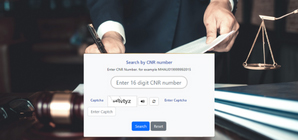
Adv. Sarika Khude
Responded 3 years ago
A.speak with the party and try to resolve mutually
Helpful
Helpful
Share

satej Chandrakant more
Responded 4 years ago
A.Dear Sir,
Need to speak with the party and try to resolve mutually. Otherwise need to consult with the lawyer.
Thanks
Adv. Satej More
Need to speak with the party and try to resolve mutually. Otherwise need to consult with the lawyer.
Thanks
Adv. Satej More
Helpful
Helpful
Share

Rameshwar Dadhe
Responded 4 years ago
A.You will need to solve it amicable otherwise fight against them in court. But you will need to pay
Helpful
Helpful
Share

Deepak Yashwantrao Bade
Responded 4 years ago
A.dear client recently The Negotiable Instruments (Amendment) Act, 2018 which came into effect from September 1, 2018 allows the Court trying an offence related to cheque bouncing or amount due , to direct the drawer to pay interim compensation not exceeding 20% of the cheque amount to the complainant within 60 days of the trial court's order to pay such compensation. This interim compensation may be paid either in a summary trial or a summons case where the drawer pleads not guilty to the accusation made in the complaint; or upon framing of charge in any other case. Furthermore, the Amendment also empowers the Appellate Court, hearing appeals against conviction under s. 138, to direct the appellant to deposit a minimum 20 % of the fine/compensation awarded, in addition to interim compensation.in this way you can solve your case .
Helpful
Helpful
Share
A.Dear Sir,
Now amendment is made to NI Act and it is treated as cheque bounce case. Which is as follow.
Section 25 in The Payment and Settlement Systems Act, 2007
25 Dishonour of Electronic Funds Transfer for insufficiency, etc., of funds in the account.
(1) Where an electronic funds transfer initiated by a person from an account maintained by him cannot be executed on the ground that the amount of money standing to the credit of that account is insufficient to honour the transfer instruction or that it exceeds the amount arranged to be paid from that account by an agreement made with a bank, such person shall be deemed to have committed an offence and shall, without prejudice to any other provisions of this Act, be punished with imprisonment for a term which may be extended to two years, or with fine which may extend to twice the amount of the electronic funds transfer, or with both: Provided that nothing contained in this section shall apply unless
(a) the electronic funds transfer was initiated for payment of any amount of money to another person for the discharge, in whole or in part, of any debt on other liability;
(b) the electronic funds transfer was initiated in accordance with the relevant procedural guidelines issued by the system provider;
(c) the beneficiary makes a demand for the payment of the said amount of money by giving a notice in writing to the person initiating the electronic funds transfer within thirty days of the receipt of information by him from the bank concerned regarding the dishonour of the electronic funds transfer; and
(d) the person initiating the electronic funds transfer fails to make the payment of the said money to the beneficiary within fifteen days of the receipt of the said notice.
(2) It shall be presumed, unless the contrary is proved, that the electronic funds transfer was initiated for the discharge, in whole or in part, of any debt or other liability.
(3) It shall not be a defence in a prosecution for an offence under sub-section (1) that the person, who initiated the electronic funds transfer through an instruction, authorization, order or agreement, did not have reason to believe at the time of such instruction, authorization, order or agreement that the credit of his account is insufficient to effect the electronic funds transfer.
(4) The Court shall, in respect of every proceeding under this section, on production of a communication from the bank denoting the dishonour of electronic funds transfer, presume the fact of dishonour of such electronic funds transfer, unless and until such fact is disproved.
(5) The provisions of Chapter XVII of the Negotiable Instruments Act, 1881 (26 of 1881) shall apply to the dishonour of electronic funds transfer to the extent the circumstances admit. Explanation. For the purpose of this section, debt or other liability means a legally enforceable debt or other liability, as the case may be.
Now amendment is made to NI Act and it is treated as cheque bounce case. Which is as follow.
Section 25 in The Payment and Settlement Systems Act, 2007
25 Dishonour of Electronic Funds Transfer for insufficiency, etc., of funds in the account.
(1) Where an electronic funds transfer initiated by a person from an account maintained by him cannot be executed on the ground that the amount of money standing to the credit of that account is insufficient to honour the transfer instruction or that it exceeds the amount arranged to be paid from that account by an agreement made with a bank, such person shall be deemed to have committed an offence and shall, without prejudice to any other provisions of this Act, be punished with imprisonment for a term which may be extended to two years, or with fine which may extend to twice the amount of the electronic funds transfer, or with both: Provided that nothing contained in this section shall apply unless
(a) the electronic funds transfer was initiated for payment of any amount of money to another person for the discharge, in whole or in part, of any debt on other liability;
(b) the electronic funds transfer was initiated in accordance with the relevant procedural guidelines issued by the system provider;
(c) the beneficiary makes a demand for the payment of the said amount of money by giving a notice in writing to the person initiating the electronic funds transfer within thirty days of the receipt of information by him from the bank concerned regarding the dishonour of the electronic funds transfer; and
(d) the person initiating the electronic funds transfer fails to make the payment of the said money to the beneficiary within fifteen days of the receipt of the said notice.
(2) It shall be presumed, unless the contrary is proved, that the electronic funds transfer was initiated for the discharge, in whole or in part, of any debt or other liability.
(3) It shall not be a defence in a prosecution for an offence under sub-section (1) that the person, who initiated the electronic funds transfer through an instruction, authorization, order or agreement, did not have reason to believe at the time of such instruction, authorization, order or agreement that the credit of his account is insufficient to effect the electronic funds transfer.
(4) The Court shall, in respect of every proceeding under this section, on production of a communication from the bank denoting the dishonour of electronic funds transfer, presume the fact of dishonour of such electronic funds transfer, unless and until such fact is disproved.
(5) The provisions of Chapter XVII of the Negotiable Instruments Act, 1881 (26 of 1881) shall apply to the dishonour of electronic funds transfer to the extent the circumstances admit. Explanation. For the purpose of this section, debt or other liability means a legally enforceable debt or other liability, as the case may be.
Helpful
Helpful
Share
Read Related Answers
Dear Client,
Generally, FD can considered as a legitimate form of security for bail in cheque bounce case. However, in most of the cases it involves specific procedural requisites, wherein, the bank c...
Dear Sir,
You just file cheque bounce case against him and then let him contest the case and prove his defence which is very hard.
Dear Client,
According to Section 138 of Negotiable Instruments Act, cheque bounce is a punishable offence with an imprisonment of up to two years and fine up to twice the amount of cheque. So, the ag...
Dear Client,
a cheque bounce case under sec 138 of the NI act must be filed within 1 month of the act and legal notice must be sent within 45 days of the offence, but if the arrest is made 5 years af...
Dear Client,
Unlike a civil summons, which initiates a lawsuit, a criminal summons doesn't trigger the criminal proceedings. It simply serves as a formal notice notifying the accused of the charges a...
Read Blogs on Cheque Bounce
Cheque Bounce Lawyers

Find Lawyers by Location

























